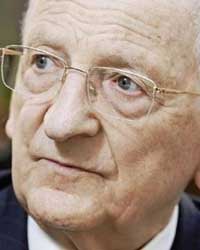
Otto Kernberg
Otto Kernberg: A Life Dedicated to Understanding Personality Disorders and Advancing Psychoanalysis
Otto Friedmann Kernberg, born on September 10, 1928, in Vienna, Austria, has been a transformative figure in psychiatry and psychoanalysis. His contributions have been pivotal in the study and treatment of personality disorders, especially borderline personality disorder (BPD), and his impact on psychoanalytic theory is recognized worldwide. Through his theories, research, and educational efforts, Kernberg has enriched the fields of psychiatry and psychoanalysis. Here, we delve into the life, career, and legacy of Otto Kernberg.
Early Life and Education
Kernberg was born into a Jewish family in pre-World War II Vienna. In 1939, to escape the horrors of Nazi occupation, his family fled to Chile. This experience of trauma and displacement spurred his early interest in psychoanalysis, as he sought to understand the psychological impacts of such life-altering events. In Chile, he attended medical school at the University of Chile, earning his M.D. in 1955. His psychiatric training took place at the University Psychiatric Clinic in Santiago, where he also pursued psychoanalytic training at the Chilean Psychoanalytic Society.
Moving to the United States and Building a Career
In 1959, Kernberg moved to the United States to further his training and found a new intellectual home at Columbia University, where he eventually became a professor. His career flourished, and he became Chief of Psychiatry at New York Presbyterian Hospital. He later served as the Director of the Institute for Personality Disorders at the Menninger Clinic, where his expertise and pioneering work in understanding personality disorders gained wide recognition.
Throughout his career, Kernberg held prestigious roles, including the presidency of the International Psychoanalytical Association. He earned a reputation as a leading figure in the development of object relations theory and was among the first to conceptualize borderline personality organization as part of a continuum of personality structures.
Theories and Concepts: Pioneering Understanding of Personality Disorders
Kernberg’s research on borderline personality organization brought clarity to a complex and misunderstood area of psychiatry. He introduced key concepts, such as splitting, a defense mechanism where individuals cannot integrate positive and negative aspects of themselves and others, leading to unstable self-image and relationships. He identified identity diffusion as a hallmark of borderline personality disorder, describing it as a poorly integrated sense of self. Kernberg’s theories highlighted the role of primitive defenses, including splitting, idealization, and devaluation, in borderline pathology.
Another major contribution was the development of transference-focused psychotherapy (TFP), specifically designed to treat BPD. This therapeutic approach emphasizes addressing the underlying aggression and managing ego weaknesses in borderline patients. Kernberg’s work continues to serve as a cornerstone for clinicians working with complex personality disorders.
Publications and Professional Impact
Over the years, Kernberg has authored numerous influential books, such as Borderline Conditions and Pathological Narcissism, as well as hundreds of articles on psychoanalysis and personality disorders. His works have earned him worldwide respect, making him a sought-after speaker and lecturer. His dedication to educating future psychiatrists and psychoanalysts has left a lasting mark on the field, and he has received numerous awards, including the Mary S. Sigourney Award for outstanding contributions to psychoanalysis.
Kernberg’s clinical research has significantly advanced the understanding and treatment of personality disorders, further cementing his role as an innovative thinker in the mental health community.
Personal Insights and Influence
Kernberg’s work is a rich blend of various influences, drawing from psychoanalytic pioneers like Sigmund Freud, Melanie Klein, and Heinz Kohut. He has integrated insights from diverse fields, including neurobiology and developmental psychology, to provide a holistic understanding of personality disorders. His theories have sparked debates and further research, often challenging and expanding traditional views in psychoanalysis.
Kernberg’s personal life has also been marked by adaptability and cultural integration. He is fluent in German, Spanish, and English, and his ability to navigate different cultures has enriched his clinical insights. He is married to Dr. Paulina F. Kernberg, a child and adolescent psychiatrist, and his family, including children who also pursued medical careers, remains a testament to his dedication to the field.
Contributions to Psychoanalysis
In addition to his work on BPD, Kernberg developed the Structural Interview, a tool for assessing personality organization that has become invaluable in clinical practice. His contributions to therapeutic technique have provided clinicians with effective strategies for managing complex personality disorders, and his supervision of other clinicians and researchers has had a ripple effect, advancing the practice of psychoanalysis on a broad scale. Kernberg has also held editorial roles in several prestigious journals, sharing his expertise and guiding the field through rigorous standards.
His involvement with psychoanalytic training institutes around the world has ensured that his insights continue to shape new generations of psychiatrists and psychoanalysts.
Continued Influence and Legacy
Now an emeritus professor at Cornell University and the Weill Cornell Medical College, Kernberg remains active in the field. He has received numerous research grants, and he continues to consult on challenging clinical cases, guiding mental health professionals with his vast knowledge and experience. A strong advocate for ethics in psychiatry, Kernberg has contributed significantly to ethical discussions in the field, and his work highlights the importance of considering biological, psychological, and social factors in mental health.
Later Life and Ongoing Work
Despite his age, Kernberg remains engaged in ongoing research and clinical practice, continually advocating for the relevance of psychoanalytic perspectives in modern psychiatry. His global influence is evident, with his theories and therapeutic techniques adopted by clinicians worldwide. Kernberg frequently shares his insights through interviews and public appearances, helping to advance understanding in the broader mental health community.
His involvement in legacy projects ensures that his theories and approaches will continue to benefit future generations of mental health professionals. Through these efforts, Otto Kernberg’s name remains synonymous with a profound understanding of personality disorders and a pioneering spirit that has shaped the field of psychoanalysis and psychiatry for decades.
